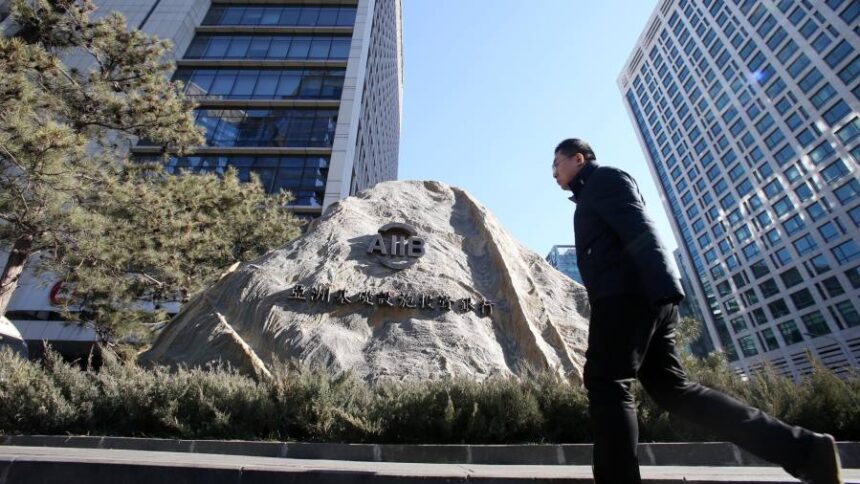Receive free Asian Infrastructure Investment Bank updates
We’ll send you a myFT Daily Digest email rounding up the latest Asian Infrastructure Investment Bank news every morning.
The Asian Infrastructure Investment Bank, Beijing’s answer to the World Bank, has approved one of its highest-profile international partnerships, just weeks after it was accused of being infiltrated by China’s Communist party.
The AIIB’s board last week approved a proposal to issue $1bn in credit guarantees against sovereign-backed loans made by the World Bank’s lending arm, the International Bank for Reconstruction and Development.
The partnership comes as multilateral development banks are trying to think more ambitiously about their role in mobilising finance. A G20 working group on capital adequacy last year recommended that development banks expand their use of financial innovation to provide additional lending capacity.
The deal with the AIIB will allow the World Bank to overcome financing constraints and issue new lending while its Beijing-headquartered counterpart will be able to better deploy its surplus capital to a broader mix of borrowers.
As a relatively young institution — it was set up in 2015 – the AIIB has only used about 43 per cent of its capital base, with committed financing of about $37bn, meaning it still has a lot of unused lending capacity.
Danny Alexander, vice-president for policy and strategy at the AIIB, linked the partnership to a broader global effort to increase financing for climate challenges by “deepening co-operation and increasing the firepower” of multilateral development banks.
“This transaction will strengthen the financing capacity of both institutions and is an example of how we can do more by working together,” he said.
The proposal was first mooted by both institutions in June shortly after the AIIB’s Canadian former head of communications, Bob Pickard, abruptly left the bank, alleging that the Communist party was running it from the shadows “like an internal secret police”.
The AIIB’s internal review this month concluded that it “follows the highest standards of multilateral governance” and there was no “undue influence” on decisions taken by the board of directors or management.
The deal with the World Bank would enable the AIIB to diversify its portfolio and increase lending to low-income borrowers, said Oliver Burnage, head of the Beijing-based bank’s portfolio risk management department.
For the World Bank, the plan would “provide relief against capital constraints” for the Washington-based institution, enabling it to extend fresh loans, according to a statement issued by the Washington-based institution in June.
The World Bank has not announced its approval of the plan and did not respond to a request for comment.
The AIIB, which was launched as a Chinese-led alternative to the World Bank and other western-led multilateral organisations, has 106 members including India, the UK, France, Australia, Canada and South Korea. The US and Japan have not joined.
China has a 26.6 per cent voting stake in the bank, which gives it veto power over important decisions.
Since its inauguration, the AIIB has signed co-operation agreements with the World Bank, with which it has co-financed a number of deals. It has a triple A rating, important for multilateral banks because it allows them to borrow cheaply and lend at lower rates to low-income countries.
Pickard’s allegations prompted Canada to halt all government-led activity at the bank while it launched a review. Pickard said at the time the Communist party was like an “invisible government” inside the bank. He did not provide specific examples of party interference in the AIIB’s high-level decision-making.
The AIIB internal review said the bank had “a solid governance structure, comparable to and built on the lessons learned from other multilateral development banks”.
“Half of AIIB’s financing has been co-financed with other [multilateral development banks],” the review said. “[The AIIB] also benefits from an AAA credit rating at all three of the principal agencies, which also assess the Bank’s governance positively.”
Pickard’s accusations come amid an increasingly acrimonious geopolitical environment between China and the US and its allies. The allegations have also heightened tensions between Beijing and Canada, with Chinese state media last month attacking Ottawa’s statements on the controversy as a “politically motivated claim to discredit AIIB”.








